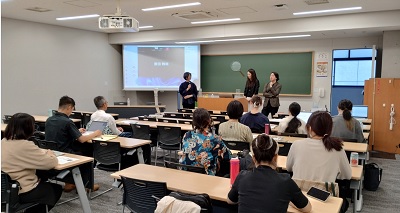Transnational Japan Seminar at HIJAS Why Transnational Perspective Matters: Citizenship and Identity of Zainichi Koreans (October 28th, 2023)2023/11/27
Transnational Japan Seminar at HIJAS
Why Transnational Perspective Matters:
Citizenship and Identity of Zainichi Koreans
■ Date: October 28th (Sat.) 2023, 14:00 ~ 16:00
■ Location: Hosei University Ichigaya Campus, Ouchiyama Building, Room Y 405
■ Presenter: Rika Lee (Chuo University)
■ Commentator: Kei Nakazawa (Hosei University)
■ Chair: Kei Takata (Hosei University)
■ Language: Japanese
For the past several years, the Hosei Research Center for International Japanese Studies (HIJAS) has been organizing workshops on the topic of “Japanese transnationalism.” This time, we invited Dr. Rika Lee, a professor at Chuo University who specializes in Zainichi Korean studies, to discuss Japanese transnationalism through the issue of citizenship and legal status of Zainichi Koreans after the Second World War.
Lee first provided us with a broad overview of the concept of transnationalism in migration studies. Then, she outlined the historical background of “Chōsen-seki” referring to her edited book “Chōsen-seki to wa nani ka (What is Chōsen-seki),” published in 2021 from Akashi Shuppan. After 1910, a number of Korean people who were incorporated into the Japanese imperial subjects emigrated to Japan. Of the approximately 2 million people of Korean origin at the time of the war’s defeat, about 1.4 million returned to the Korean peninsula from Japan. Those who remained in Japan were registered as aliens under the Alien Registration Ordinance in 1947 while maintaining Japanese citizenship at the same time. In the column indicating the nationality and place of birth, it was written “Chōsen (朝鮮),” although this did not imply nationality since the two states were not established in Korea until 1948. Later, when Japan regained its sovereignty in the San Francisco Peace Treaty (1952), Zainichi Koreans became “foreigners” with the “domicile(籍)” of “Chōsen” that did not officially belong to any nation. The 1965 Japan-Korea Treaty made it possible for Korean nationals to apply for permanent resident status in Japan, and the number of those who switched to Korean nationality increased. Still, there were those who kept their alien registration as “Chōsen.” As of December 2022, there were 25,358 “Chōsen-seki” people who do not officially belong to any nation (de facto “stateless”). They are subject to various restrictions on international travel, including entry into and exit from Japan and entry into South Korea.
Although the motivations of those who maintained their “Chōsen-seki” status are diverse, in her presentation, Lee emphasized its transnational aspect. Among the people of “Chōsen-seki,” there are those who have “transnational identity,” a sense of belonging that transcends national boundaries. Such transnational identity can be represented by one of the informants who mentioned, “I belong to neither North Korea nor South Korea, but at the same time belong to both North Korea and South Korea,” as well as “Japan.” In previous studies, it has been understood that Zainichi Koreans’ identities lie somewhere between “Korean” and “Japanese.” Here, Lee sees not only “methodological nationalism” but also “methodological ethnicism” in such a view. “Methodological ethnicism” is a consciousness that tries to fit people into the framework of a single ethnicity, such as “Japanese” or “Korean,” and at the same time, it is a perspective that marginalizes those who fall outside of this static ethnic framework. The existence of “Chōsen-Seki,” who feel belongings to “neither North Korea nor South Korea, but at the same time both North Korea and South Korea” and “Japan,” points to the importance of a transnational perspective that goes beyond the “methodological ethnicism.” During our previous “Transnational Japan” workshop, anthropologist Takami Kuwayama asked how we can understand “transcending ethnicity” in the context of transnationalism, given that the word “nation” is translated not only as “kokumin (nationality)” but also as “minzoku (ethnicity)” in Japanese. Unexpectedly, Lee’s talk seemed to be a relevant response to the question posed by Kuwayama. Furthermore, although we were not able to discuss it thoroughly given the limited time of our workshop, we were reminded that the issue of “Chōsen-seki” is an insightful case study for understanding the “form of transnational Japan.” When looking at “Chōsen-seki” to capture the characteristics of Japanese transnationalism, it is perhaps crucial to compare it with other people under “stateless” conditions. For example, the experience of Jewish people deprived of their nationality by Nazi Germany during the Second World War, such as philosopher Hannah Arendt.
As a commentator, we invited Kei Nakazawa, a writer and professor at the Faculty of Letters, Hosei University, who has also been actively involved in anti-hate speech activism. At the end of her presentation, Lee pointed out the problem of sexism against Zainichi Korean women by showing video clips of hate speech on the street. Nakazawa also explained the contexts of hate speech by sharing her experience of activism against it. Furthermore, she noted that this year (2023) marks the 20th anniversary of the broadcast of the Korean drama “Winter Sonata,” which was a massive hit in Japan. She emphasized that mutual understanding between Japan and South Korea has rapidly progressed since the drama was broadcast. The acceleration of transnational activity inevitably entails xenophobia and other human rights issues in one way or another. However, at the same time, Nakazawa delivered a strong message that, on the other hand, the “power of culture” would be a tool to generate positive transnational interaction.
Kei Takata (Hosei University)

【a day at the Seminar】

